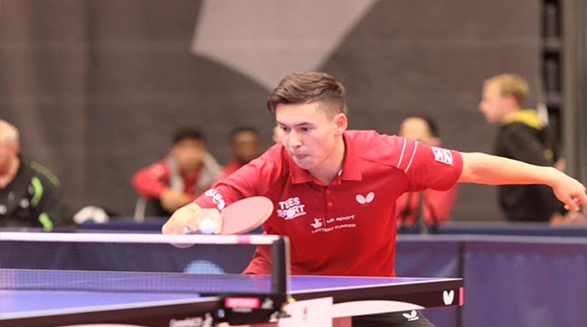We talked table tennis and multiple epiphyseal dysplasia with Paralympian Ross Wilson
Ross Wilson started playing table tennis when he was just eight years old. He had success in abled-bodied table tennis, and as a junior was ranked in the top ten in the country, winning two national doubles titles. However, as he got older it became clear that some physical problem was affecting his physical development, although exhaustive medical tests over a ten year period failed to discover the cause. Finally, after years and years of hospital visits, he got his diagnosis; Ross has a genetic condition called multiple epiphyseal dysplasia, which affects his bones and their growth. After getting his diagnosis, he started training with the GB Paralympic Table Tennis squad. Ross’s progress was rapid, and his first international season culminated in a silver medal in the European Championships in 2011. At the age of 17 he was the youngest member of the GB table tennis team in London 2012. We asked Ross some questions and he kindly obliged.
DTL: What are your most prominent challenges and how do you overcome them?
Ross: Since getting my diagnosis, I have been competing in the Paralympic scene. I love my sport and train very hard – although my disability means I am prone to injury if I train too much. This can be challenging, as I am always eager to push myself, but I can never push too hard otherwise there is a strong chance I will suffer an injury, and that could potentially prevent me playing in major competitions, which is obviously, my main goal as a sportsman.
DTL: What keeps you motivated?
Ross: I always feel privileged to represent my country; I want to make the nation proud, and this gives me the drive and determination to be the best that I can be. The best thing about my work, is that young people look to me as a role model. I hope to inspire the next generation and influence them in a positive way; I want them to know that you can achieve anything if you put your mind to it. I hope to support as many charities as I can, such as Ditch the Label.
DTL: Our research found 63% of those with a physical disability are far more likely to experience extreme bullying and social exclusion. What advice would you give to any of our readers who may be experiencing bullying or feel like they don’t fit in/ doubt themselves because of attitudes towards a disability?
Ross: Of course, everyone carries some sort of insecurity with them, but at the end of the day, the only opinion that really matters is your own. If you are confident within yourself, and that is the image you are outwardly projecting, other people are more likely to treat you accordingly. Follow your dreams and try to stay as positive as you can, no matter what.
DTL: We have consistently found that young people are restricted by gender stereotypes and face considerable social consequences for not conforming to them. What is your perception of masculinity in 2016 and what needs to change?
Ross: Even today, in 2016, stereotypes still exist and there is definitely a stigma attached to those who do not conform to what is considered, the ‘norm’. However, I do believe that these stereotypes are being addressed – it is becoming more acceptable for a man to have, and show, a feminine side and vice versa. It has helped that several notable celebrities have spoken out about these issues over the last couple of years, but we still need to work together to rid society completely of gender inequalities.
DTL: What three words best describe you?
Ross: Kind, fighter and determined.
Follow Ross on Twitter














